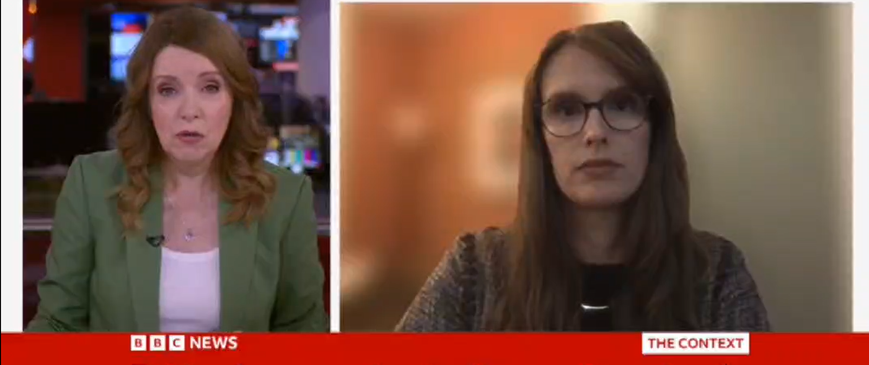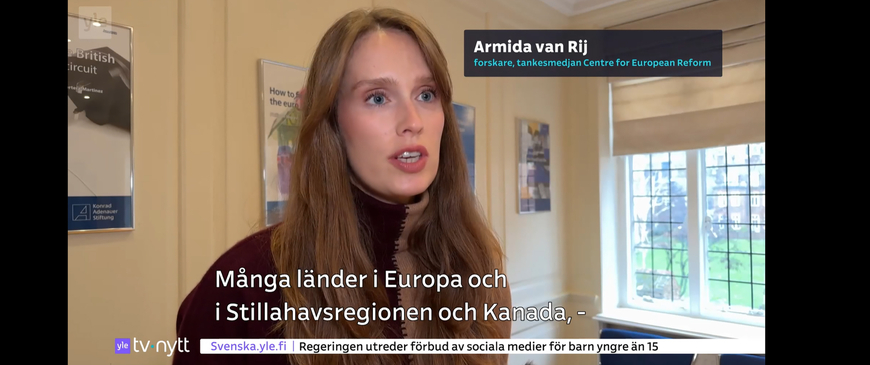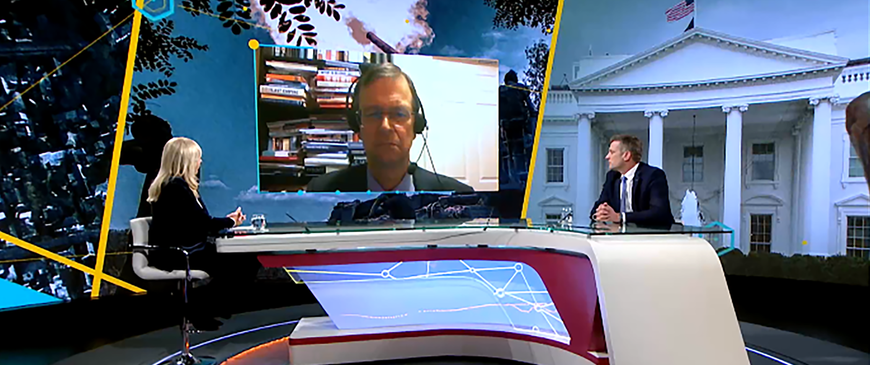Press
How France went from loner to leader on European defence policy
04 September 2013
The Globe and Mail
Mr Hollande is "the last man standing in Europe so to speak. He’s the go-to guy," said Rem Korteweg of the CER. The French President "is opportunistic and he’s willing to seize the moment to show himself as the unquestioned leader of Europe on defence and security issues.
Influencing Egypt with soft power
02 September 2013
The New York Times
"During the entire two years, the EU was seen as an honest broker. Maybe [Catherine] Ashton could have used that leverage more than she did," said Rem Korteweg, a foreign policy analyst at the CER.
Obama w pułapce - Interview with Ian Bond
01 September 2013
Rzeczpospolita
Niepokoi mnie, że na Zachodzie wszyscy koncentrują się na tym, jak przeprowadzić atak na Syrię. Znacznie mniej jest dyskusji o tym, w jaki sposób może na to odpowiedzieć Asad – podkreśla brytyjski ekspert ds. międzynarodowych w rozmowie z Jędrzejem Bieleckim.
How much Europe is too much Europe?
01 September 2013
Reuters
"It's like playing Jenga," said Hugo Brady of the CER, referring to a game that involves carefully removing wooden blocks from a tower and stacking them on top. "Eventually someone pulls out the wrong block and the whole thing collapses."
While Britain votes No, France still backs strikes on Syria
31 August 2013
NPR
"We have a dossier from the joint intelligence committee. It doesn't say 100 per cent that we are certain that it was the Syrian regime that fired these weapons. And you've got a sort of rush to try and get something done even before the UN inspectors have finished their work and reported and so on", said Ian Bond, director of foreign policy at the Centre for European Reform (from 02.15).
Living in a state of seamless war
29 August 2013
The New York Times
In Egypt, said Rem Korteweg of the Centre for European Reform, developments have conspired to place Europe "in the uncomfortable position of giving preference to its security interests over its liberal values, without being sure it can protect either."
Why the Greek privatisation programme is failing
19 August 2013
BBC World business report
The CER's John Springford discusses the sacking of Greek privatisation chief Stelios Stavridis, and why his programme is failing, with the BBC's Roger Hearing. (From 11.53)
I'll trade you: The US and Europe settle in for Transatlantic talks
15 August 2013
The financialist
"This is not the first such initiative to free up transatlantic trade and investment, and all previous initiatives have resulted in failure," Philip Whyte, of the CER, told The Financialist.
The Tories' political cul-de-sac on EU migration
08 August 2013
E!Sharp
Right from the start, EU immigration was the glaringly obvious hole in David Cameron’s pledge to "reduce net immigration into the UK from the hundreds to the tens of thousands".
Helpt Nederland Cameron bij de hervorming van de EU
02 August 2013
Trouw
David Cameron zoekt bondgenoten om de Europese Unie terug in het hok te duwen. Hij rekent daarbij op Nederland, de traditionele wapenbroeder als het gaat om tegenwicht aan Brussel of de Duits-Franse as.
Germany's new coalition to set agenda for EU energy policy
01 August 2013
Natural Gas Daily
"Germany is so dependent on Russian gas that the question of its own potential energy reserves becomes a foreign policy issue as well as an energy issue," said Stephen Tindale of the CER.
Esperanzas y obstáculos en Myanmar
01 August 2013
ESglobal
Myanmar (antigua Birmania) tiene por delante un largo y difícil camino hasta alcanzar la estabilidad política, la democracia y el desarrollo económico. La esperanza es que Aung San Suu Kyi sea capaz de unir a la nación y encabezar las reformas necesarias tras las elecciones de 2015.
Berlin finds few allies for austerity push G-20
22 July 2013
The Wall Street Journal
"The idea that Germans would even get backing from other Europeans was rather fanciful, and the idea that Americans would go along with targets was far-fetched," said Simon Tilford of the CER. ..."More people are questioning whether austerity in Europe has been self-defeating," he said.
Navalny's sentence will influence the Russian economy
19 July 2013
Valdai Club
Russian opposition leader and anti-corruption blogger was released from custody on Friday. Member of the Valdai discussion club Charles Grant discusses the new turn in the matter.
What will be the consequences of the conviction and verdict on Alexei Navalny for the Russian political system?
I think the main consequences...
What will be the consequences of the conviction and verdict on Alexei Navalny for the Russian political system?
I think the main consequences...
Letta a Londra si sforza di non vedere le nubi
18 July 2013
Europaquotidiano
La delegazione scivola di appuntamento in appuntamento, tra Downing street, il Centre for European Reform, uno dei think tank più prestigiosi, dove lo accoglie Bill Emmott; c’è spazio anche per un taglio di nastro nella nuova sede del Consolato italiano a Farringdon street.
The politics of bringing democracy to Brussels
18 July 2013
The Wall Street Journal
Charles Grant, director of the CER, says using the parliamentary elections to choose the commission president is "fraught with potential dangers." If the commission gets too close to Parliament, as this change would make likely, it could further undermine its credibility with member states, he says.
UK and Ireland plan visa-free common travel area to boost growth
17 July 2013
Financial Times
"Any kind of co-operation like this is good. But the UK would do even better to deepen its co-operation with the actual Schengen area, especially on visas," said Hugo Brady, a senior research fellow at the CER.
The European Investment Bank's new screening and assessment criteria for energy projects
17 July 2013
The European Investment Bank's new screening and assessment criteria for energy projects is welcomed as a significant step forward in moving the European Union to becoming a low carbon economy while generating sustainable growth and jobs.
Politexperte Hugo Brady: «Ich halte nicht viel von Untergangspropheten»
15 July 2013
Migros Magazin
Wohin steuert Europa? Ist das Modell EU überhaupt reformierbar? Das Migros-Magazin hat Hugo Brady, einen der ausgewiesensten Spezialisten in Sachen Europa, gefragt. Der Ire über Reformen in Zeiten der Krise und über die Schweiz als Vorbild der Grossen im Staatenbund.
Hugo Brady, auf dem ganzen Kontinent steigt die...
Hugo Brady, auf dem ganzen Kontinent steigt die...
Think-tank of the year
15 July 2013
Prospect
This year’s International Affairs Think Tank of the Year award goes to the Centre for European Reform... This year, the judges were impressed by the strength of the CER’s economic analysis and its choice of subjects has gone right to the heart of the most pressing debates.























